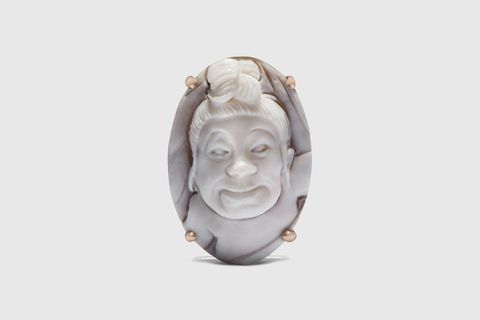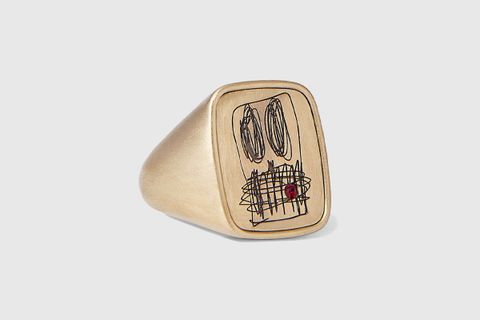What's Up With Famous Dudes Launching Nail Polish Lines?
Nail polish is having a moment. Specifically, nail polish created by famous dudes.
Tyler, The Creator just launched a trio of nail lacquers under his GOLF le FLEUR* imprint (which, it's worth noting, also recently introduced fragrance).
Offered in "Geneva Blue," "Georgia Peach" and "Glitter," the glazes first debuted at the rapper's pop-up in Malibu, a pastel-colored utopia that saw JAY-Z, Kanye West, and Andre 3000 pull up.
Tyler's launch closely follows the announcement of Machine Gun Kelly's UN/DN LAQR and Harry Styles's Pleasing, also nail polish lines.
The fact that three male-identifying celebrities have debuted beauty brands in the past month speaks to the gradual dissolution of gender binaries that the beauty industry, and society in general, have long operated on.
And, while I'm all for overhauling outdated notions of gender, I'm not sure how to feel about the hyperbolic praise that's lavished on celebrities such as Tyler, MGK, and Styles whenever they do so much as dabble in anything traditionally designated as "feminine."
Is a man wearing a dress, or eyeliner, or a pink suit really newsworthy?
Don't get me wrong — it's great that men are starting conversations on beauty and self-care, as well as wearing whatever the hell they please. After all, it's pretty inane that items like nail polish or skirts hold gendered meaning.
But Billy Porter touched on the nuance of these celebrities dabbling in practices rooted in queer culture.
In an interview with the Sunday Times, Porter addressed Styles's recent Vogue cover, a photograph that showed the former One Direction star wearing a Gucci dress.
"He's just doing it because it's the thing to do," Porter said of the singer's get-up. "This is politics for me. This is my life. I had to fight my entire life to get to the place where I could wear a dress to the Oscars."
Though Porter's assertion that Styles only wears dresses for brownie points is subjective, an article on the debacle by NPR's Jireh Deng makes an apt point.
"Porter is fair to critique Styles' positionality as a straight-passing white man who hasn't publicly lived through the isolation and shame of the AIDs crisis, or faced career threats like Porter's lived experiences as a Black gay man in the acting industry," Deng writes.
"Styles, with his largely apolitical stance and soft presence online, presents a more palatable symbol of rejecting gender conformity for Vogue than other more vocal, politically invested openly LGBT individuals... [he] hasn't had to substantially risk anything in pursuing his artistic self-expression, compared to LGBT artists of color."
Deng adds that gender-queer fashion — and, I'd argue, gender-queer beauty — was born out of a struggle to remain visible in the face of LGBTQ erasure.
A similar argument can be applied to Machine Gun Kelly's project, which follows the rapper's experimentation with nail art and even long, ornate acrylics, a style that was popularized by Black women and eventually gentrified by celebs including the Kardashians.
And, while speculation about Tyler's sexuality has long been a talking point in the press, it's important to remember that he used to throw around plenty of homophobic and misogynist rhetoric in his music and on social media.
None of this is to say that men wearing nail polish is bad, or that male celebrities shouldn't launch beauty lines. Nor is it a call to quote-unquote "cancel" anyone.
Instead, it's a prompt to think more deeply about what, exactly, Styles, MGK, and Tyler are cashing in on.


